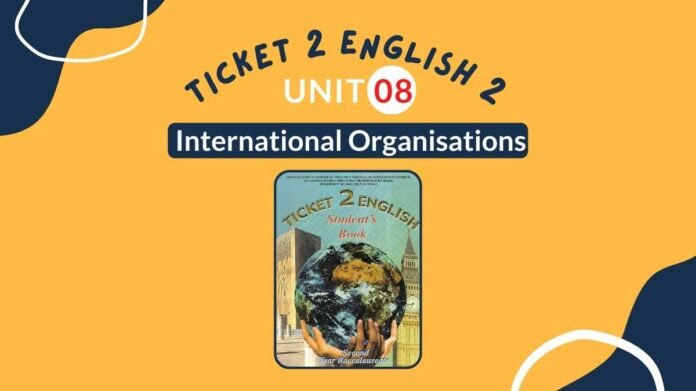You will find a concise summary of the essential elements of “Ticket 2 English Unit 8 International Organisations” in this post, including vocabulary, functions, grammar, and writing.
TABLE OF CONTENT
- Vocabulary
- Functions: Expressing Good News and Bad News
- Grammar: Linking Words
- Writing: Formal Letter
Vocabulary Ticket 2 English Unit 8
According to Wikipedia:
An international organization is an organization with an international membership, scope, or presence. There are two main types: governmental and non-governmental organizations. These pages provide facts sheets about some of these organizations.
1- Acronyms (abbreviations) of Famous International Organizations
- UNESCO: United Nations Educational Scientific and Cultural Organisation
- ICESCO: Islamic World Educational, Scientific and Cultural Organization
- UNICEF: United Nations Children’s Emergency Funds
- UNHCR: United Nations High Commissioner for Refugees
- WHO: World Health Organisation
- FAO: Food and Agriculture Organisation
- ICRC: International Committee of the Red Crescent / Cross
- TI: Transparency International
- AI: Amnesty International
- BIS: Bank for International Settlements
- ILO: International Labour Organization
- ITU: International Telecommunication Union
2– Some Collocations Related to International Organisations
- Address global challenges
- Address poverty
- Advocate for gender equality
- Combat climate change
- Combat corruption
- Combat cyber threats
- Combat disease
- Combat piracy
- Combat terrorism
- Combat trafficking
- Conduct peace negotiations
- Coordinate aid
- Coordinate disaster response
- Declare a ceasefire
- Deliver emergency relief
- Ensure nuclear non-proliferation
- Ensure security
- Enhance bilateral relations
- Enhance cooperation
- Establish diplomatic ties
- Facilitate cultural exchange
- Facilitate dialogue
- Facilitate diplomatic talks
- Facilitate international trade
- Facilitate peace
- Facilitate trade
- Foster economic cooperation
- Give a farewell speech
- Hold a summit
- Implement sanctions
- Maintain peace
- Monitor compliance
- Monitor human rights
- Negotiate a peace treaty
- Negotiate treaties
- Offer financial assistance
- Organize a fundraising campaign
- Promote democracy
- Promote education
- Promote equality
- Promote global health initiatives
- Promote sustainable development
- Provide assistance
- Provide humanitarian aid
- Recruit volunteers
- Restore order
- Run a campaign
- Settle a dispute
- Spearhead peacekeeping efforts
- Strengthen international security
- Strengthen ties
- Support refugees
- Veto a decision
3- Other Vocabulary Related to International Organizations
Officials (persons)
- Spokesman
- Deputy
- Diplomat
- Vice President
- Commissioner
- Ambassador
- Secretary-General
Documents
- Charter
- Resolution
- Report
- Declaration
- Constitution
Establishment (places)
- General Assembly
- Headquarters
- Congress
- Court
- Council
Functions: Expressing Good News and Bad News
Telling Bad News
- I feel sad to tell you that…………
- I am sorry to tell you such bad news, but…………….
- I know it’s bad news, but…………….
- Pull yourself together, ……………..
- I’ve got a bit of bad news to tell you……
- I have some bad news for you, ………
Telling Good News
- You won’t believe such good news, ……………….
- I have some joyful news for you, ………………
- I have some excellent news to tell you, …………
- I’ve got a bit of good news to tell you……
Responding to Good News
- Sounds great
- My goodness
- That sounds like great news!
- Superb
- Congratulations
- Great news
- I’m glad to hear that!
- You cannot imagine how glad I am to hear such great news
- Are you kidding
- I can’t believe it
- What fantastic news!
- Really?
- Incredible
Responding to Bad News
- Sorry to hear that
- Oh, my Lord
- I’m sorry to hear such bad news.
- You cannot imagine how sad I am to hear such bad news
- Are you kidding
- I can’t believe it
- That must be terrible
- Really
Grammar: Linking Words
Linking words show logical relationships between clauses in a sentence, between sentences within a paragraph, or even between paragraphs. They may convey ideas such as addition, contrast, concession, time, reason, result, etc.
Below are the most frequently used Linking words in Moroccan English textbooks.
Click here to see LINKING WORDS LESSON
Exercises are here:
Writing: Formal Letter
Click on the image below for this lesson: How do You Write a Formal Letter?




the lesson concerning writing in this unit is about writing an e-mail not a fromal letter
A formal letter to the editor or to an organization ( such as the case is unit 8) or to authorities or to a school magazine is similar to a formal email. The focus of the lesson is writing a formal letter/email: they are the same despite very few differences especially concerning addresses. At this point students should not worry much about this
Thank you
Writing?
Very nice and useful website 😉
good luck
thanks a lot